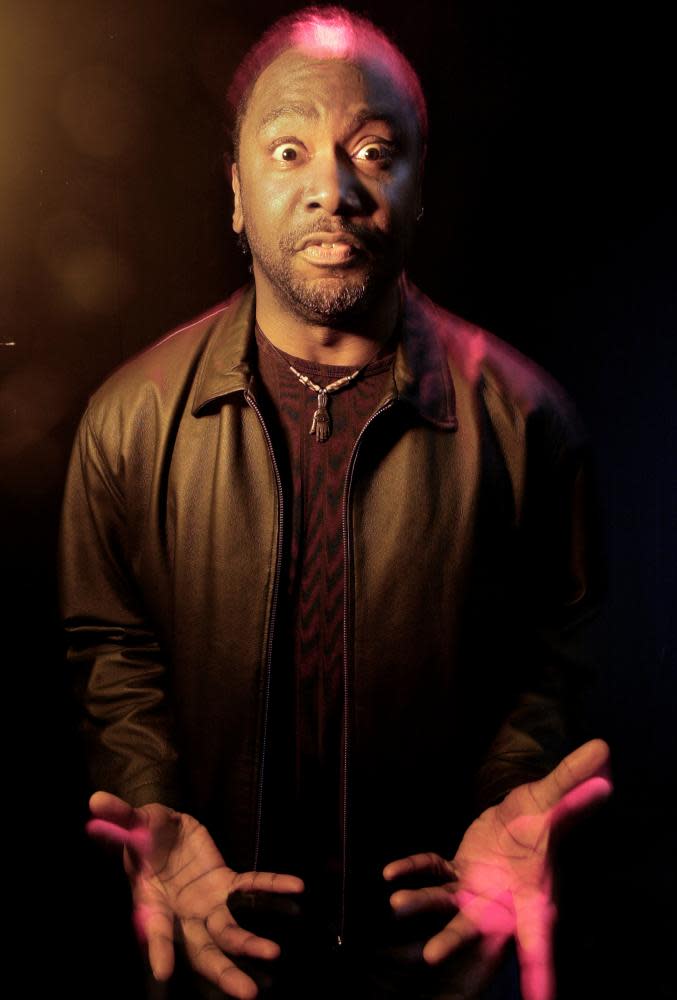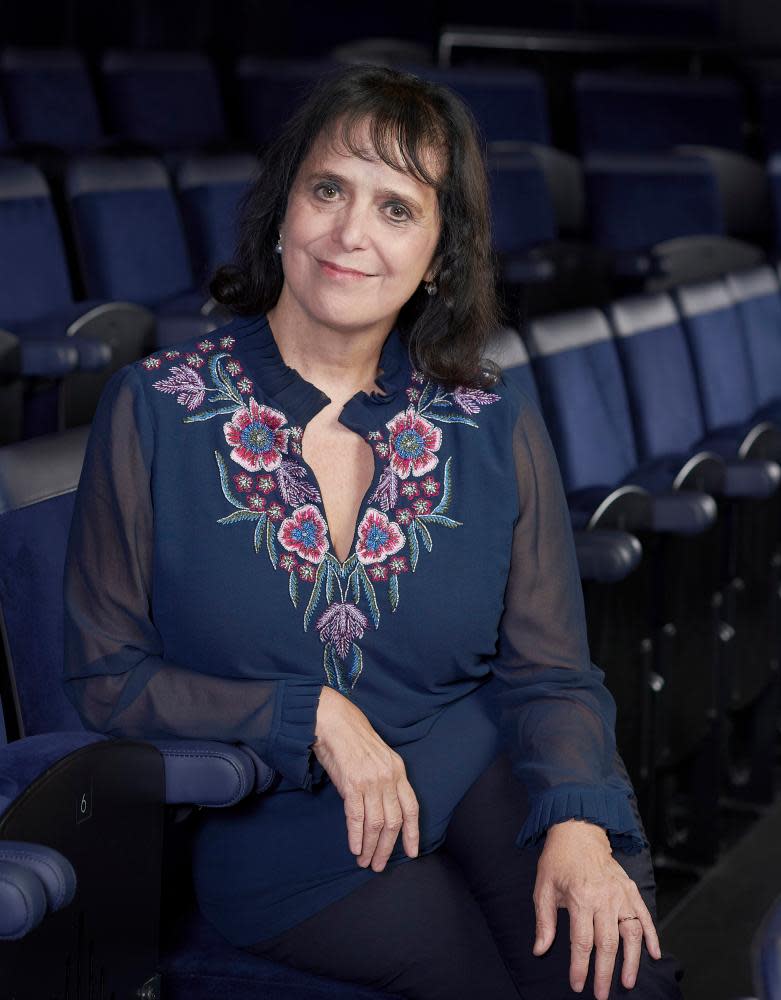‘It comes down to taste’: how the Edinburgh comedy awards find tomorrow’s funniest stars
Comedians have a reputation for being tough: the street fighters of the entertainment world. But in just a few weeks – on 27 August – a select group of hopefuls will be shifting from foot to foot, waiting to hear either good or bad news. For the 40th time in its quirky history the Edinburgh comedy prize – formerly known as the Perrier and now as the Dave award – will be made to the outstanding Edinburgh fringe act of the 2022 season.
“Personally, the announcement is quite a difficult moment, upsetting even,” confesses Nica Burns, who has run the prize-giving process for more than three decades. “I greet the nominees and they are all reading my face to try and work out the result. I usually know who is going to be most disappointed, and I often hug them later.”
Further consolation for this handful of defeated nominees can be found in the fact that they are the joint standard setters for comedy at the Fringe festival. This is because the history of the award, in its various branded versions, is also a map of British show business that revealed its future.

Edinburgh’s twisting wynds and cobbled closes may still be booby-trapped with jugglers and mime artists every summer, but for a good 20 years now the real business of the fringe has been the training and recruiting of the comic talent that fuels British theatre, film and television. Back in 1996, the writer and actor Ben Miller recalled his nerves on award night, when he stood with his comedy partner, Alexander Armstrong, among fellow nominees, trying to push away the thought they might win. His dream was that, although Bill Bailey was the odds-on favourite, old Perrier prize lore would prevail and an outsider would grab the trophy, just as they had when Steve Coogan beat Jo Brand in 1992 and when Alan Davies was pipped in 1994.
But in the end Jenny Eclair, the previous year’s victor and the first woman to win the prize, handed the title on to Dylan Moran, so Armstrong and Miller had to smile gamely alongside their fellow “also-rans”, Bailey, Al Murray, Rich Hall and Dominic Holland. (Hall and Murray went on to win in subsequent years, while Holland, father to Spider-Man actor Tom, had won best newcomer in 1993.)
Burns is now one of the West End’s leading theatrical impresarios and so she really doesn’t need her sideline in Edinburgh. But she is wedded to the awards. “It is a belief and a passion,” she said this weekend. And she once put her money where her heart is, funding the prize herself, in lieu of a new sponsor.
“It is part of my love of the whole of the fringe,” said Burns, adding that she learned her craft at the festival when she took up her own improvised show after university. It taught her the core skills of staging and promoting productions. “We made a profit of £40 that year and it was the best money I ever earned.”
Her show transferred to a small London theatre. Soon she took over as artistic director of the Donmar Warehouse, before ultimately controlling a network of London venues from her Covent Garden eyrie at Nimax Theatres. In a deal struck with bosses at Dave in 2019, the awards are now sponsored by the television channel. Previous sponsors have included Foster’s lager and lastminute.com.
And the prize still matters, because its roll call of honour regularly predicts the household names of the future, from Stephen Fry, Hugh Laurie and Emma Thompson, to the stellar cast of The League of Gentlemen, and to Frank Skinner, Richard Ayoade and Russell Kane. And if you include comedians who were merely nominated, things get really ridiculous. To start with there are Omid Djalili, Noel Fielding, Peter Kay, Alan Davies, Lee Mack, Jack Dee, Sarah Millican, Michael McIntyre, Reginald D Hunter, Sara Pascoe, Flight of the Conchords, John Bishop, Lily Savage (aka Paul O’Grady) and Nish Kumar. It is a tired trope to say it would be easier to list those big beasts in entertainment who have no Edinburgh comedy award past, but it would.
Perhaps even more significant are the names of all the experimentalists lurking in the list of winners and nominees, the performers who still draw big audiences into live theatre because of the power of their vision, comic or otherwise. Among these titans are Eddie Izzard, Johnny Vegas, Simon Munnery, John Shuttleworth (aka Graham Fellows), Ross Noble, Milton Jones, Bridget Christie, Daniel Kitson, Mark Watson, Tim Key and surrealist theatre company Complicité. And among the mourned, the lost stars of live stand-up who regularly shone on television panel shows are the late Sean Hughes (still the youngest prize winner, at 24 in 1990), Sean Lock and Jeremy Hardy.
The story of the prize is the story of comedy on the fringe, and is, of course, controversial because it reflects the wider rows that have beset popular culture. There was too much Oxbridge, then there was too much swearing and not enough women. Then it was too commercial and there was no diversity. More recently there have been concerns about protecting the mental health of performers and about the fear of “cancellation” from increasingly censorious audiences.

For Burns, the weightiest of these themes is women’s growing contribution to the world of stand-up comedy. “This was the biggest issue and also the slowest to develop,” she said. “It may have changed first on television, but it took a very long time for the clubs to change. There was a lot of verbal abuse. And I look back with horror at all those all-male shortlists for our prize.”
But another major trend for analysts of the fringe is the huge increase in the size of the festival and the great dominance of comedy. When Burns began her reign, just 35 acts were eligible for the comedy award. In 2019, before two festivals were cancelled in the pandemic, there were 757. That is a lot of shows to see in 10 days before drawing up a shortlist.
This year the number of comedy shows to be considered – they have to last more than 50 minutes and comprise mostly new material, is slightly lower, but there are still hundreds to see. The awards use 20 scouts – people who were previously on the judging panel – to score the shows and then the panel judges, critics, professionals and chosen members of the public, start criss-crossing the city to watch them all. In response to the size of the festival, the shortlist is now longer than it was in the early days – eight or nine acts rather than four or five.
Burns has watched as the influence of the sketch show dwindled, then flickered into life again only intermittently. The stand-up is now king, or queen. Yet judging apples from pears remains a challenge for the judges. Although Burns is a disinterested party with no vote, she has observed tears and some raised voices, as well as some charming attempts at rigging the result, as when Jeremy Hardy handed her a note in 1988 saying, “Can I win this year?”. It was a genuine coincidence when the judges obliged.
In 1991 there was a particularly “ferocious” debate, Burns recalled. Izzard, Dee, Savage and Skinner were all in contention. “The judges chose Frank in the end because he changed his set to suit the audience once his show started to sell out. That clinched it. The audience is always a character in a performance.
“The nominees are always good, so it comes down to taste,” she added. “I sometimes disagree with the choice, but it is not about my opinions. Often there are just too many good nominees. We have had some golden years. In 1992, we had to create the best newcomer prize to reward Harry Hill, because all the other nominees were so good.”
Shortlisted shows are so varied that fervent fans of one act can be left cold by another. Burns used to run a club night with all the nominees on the bill, each performing a bit of their set. She recalls that when The Mighty Boosh took to the stage in 1999, the audience just gaped blankly back at them. “When they came off I asked how they were and luckily they just laughed and laughed. They said, ‘They didn’t get us!’ I asked if they wanted to duck out of the next night’s show, but they wouldn’t hear of it.”
The value of the awards as a test bed for future writers and directors is as crucial as the prize itself, Burns said: “A lot of the performers later move sideways. I saw Patrick Marber try different genres of comedy, and now he is a playwright – and a great stage director, too, in my opinion. His recent West End version of Travesties, a difficult Stoppard play, was so clever.”
American Bo Burnham is making acclaimed films and Laura Solon, a winner in 2005, is now a screenwriter in Hollywood, while 2005 best newcomer Tim Minchin is the creator of the hit musical Matilda, and Sophie Willan has just won a Bafta for the TV drama Alma’s Not Normal. Other comics are now established as chat or game show hosts, their audience skills honed on the fringe. Among this tribe are Graham Norton, Jimmy Carr, Greg Davies, Michael McIntyre, Sarah Millican, Adam Hills and Alexander Armstrong, of Pointless fame. Prominent “straight” actors include Lee Evans and Miles Jupp.
The messiness of the fringe, its uncurated variety, is vital for Burns. But taking a comedy show there is not for the faint-hearted. “Dying on stage is an incredibly painful experience and a comic’s life is very exposing,” she said. “It is better, of course, if you are very successful.”
The key, four decades of the comedy prize suggests, is to take being funny extremely seriously.
Edinburgh comedy prize controversies
Comedian and poet John Hegley was heavily tipped to win in 1989, so a Scottish newspaper carried his photograph the next day, even though rival Simon Fanshawe had won unexpectedly.
In 1999, the awards panel reinstated comic Al Murray following an appeal against a ruling he was ineligible because he was too successful, having already been nominated four times. His xenophobic stage character, a boorish pub landlord, then had to accept a prize sponsored by a French mineral water company.
During the filming of a Channel 4 documentary series, Edinburgh or Bust, about the 1999 fringe festival, the avant garde comic and nominee Simon Munnery ran off with the winner’s trophy. After a street chase, he was cornered with it in an Edinburgh playground.
2005 saw the climax of a four-year Edinburgh campaign against Nestlé, owner of the Perrier brand since 1992. Protesters opposed the parent company’s promotion of baby milk powder to people in developing countries. Campaigners, who had already set up an alternative Tap Water award, projected a slogan on to a wall at the awards venue. In 2006, Nestlé withdrew its sponsorship.
In 2002, the reclusive Yorkshire comic Daniel Kitson accepted his prize by giving a speech in which he claimed to be in Bermuda. He then left the awards party to make an appearance, which became famous, as compere of the festival’s Late and Live show instead, brandishing his trophy.
The prize was shared for the first time in 2017 when judges could not decide between Hannah Gadsby and John Robins. Both were awarded £10,000 in prize money, in what the awards organisers described as an “expensive year”.


